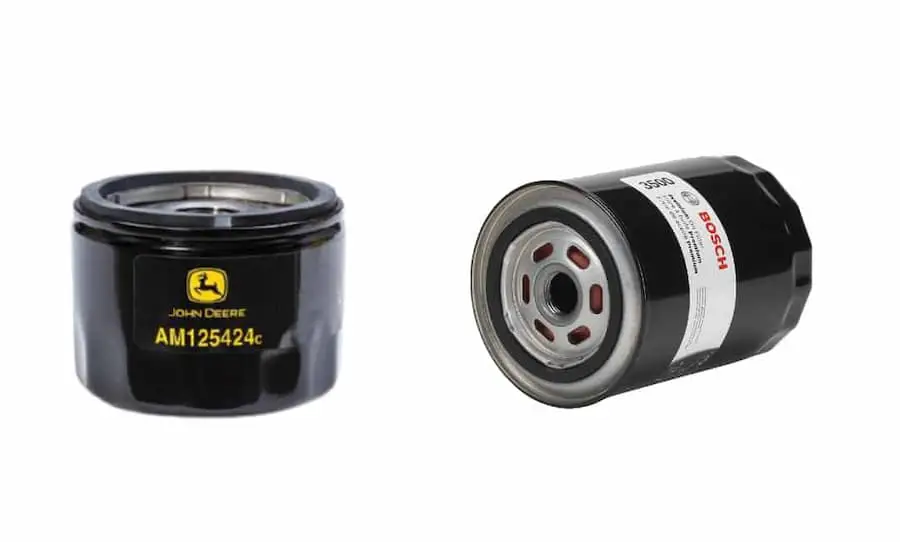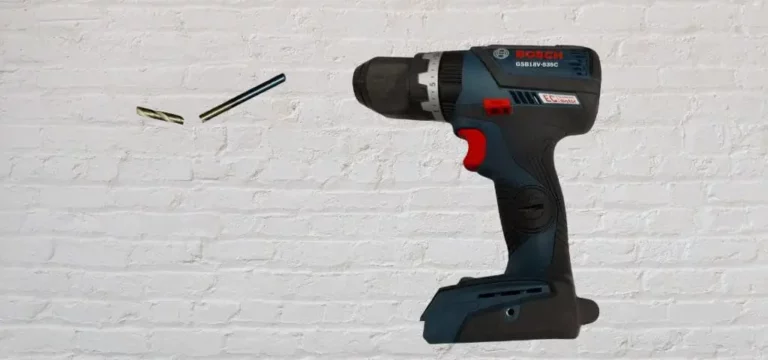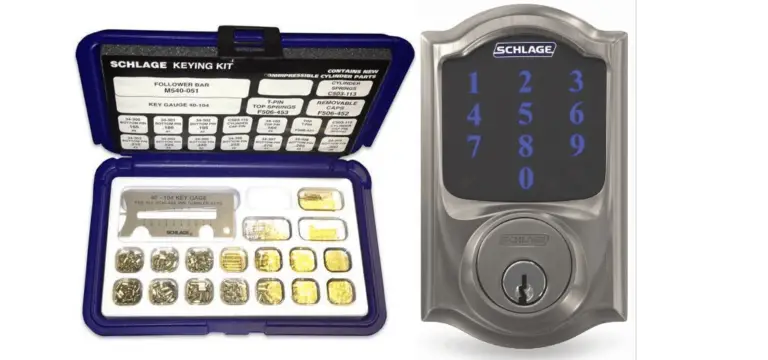Can You Use a Car Oil Filter on a Lawn Tractor?

When doing maintenance, not everything is obvious, especially if you’re new to the equipment you’re working with. A common issue people run into is wondering whether they can use regular car oil filters in their lawn tractors, or if it would mess something up. Are car oil filters okay to use after all?
If a car oil filter physically fits on the lawn tractor, it’s likely suitable for use. Features to improve its performance on your small engine are an anti-drain back valve to prevent dry starts, plus a waterproof material to prevent filter damage. Never force a filter into place if it doesn’t go on.
This article will go over basic information about car oil filters, lawn tractor oil filters, and other relevant information for lawn tractor owners to peruse.
How Do Oil Filters Work?
Oil filters in lawn tractors and other small engines are very similar to the filters used in cars, at least in principle. All oil filters have three basic characteristics that determine how well they function.
These characteristics are:
- The container or ‘can’
- The rubber gasket sealing the filter
- The synthetic fiber that makes up the actual filter
Oil is a key ingredient in making any combustion engine work, and filters are key to keeping it from damaging the engine and other components within the machine.
Oil filters are screwed into the engine, where oil is forced into the filter’s can. Here, it seeps through the filter and leaves hard particles like dirt, metal, and other contaminants behind in the filter. The newly cleaned oil is then forced back into the engine to be used in lubrication and other functions.
Why Do I Need To Replace Oil Filters?
Engine oil circulates throughout an engine and picks up particles like tiny bits of the engine, by-products of combustion, and even atmospheric particles like dust from the air outside can enter the engine and get into the oil.
Running the same oil through the same system will result in it picking up more particles and contaminants, and the oil gets dirty. So what does dirty oil mean for an engine?
Engines are, at their core, giant moving metal pieces grinding against each other.
Without the lubrication that oil provides, they would wear away to nothing in no time at all. Clean oil is formulated to provide the ideal level of lubrication to engines, but dirty oil is almost worse than no oil at all for engines.
Dirty oil directly damages engines in several ways.
The contaminants carried in it wear at the engine block and can cause cracks. In addition, dirty oil is less efficient than clean oil. Lower efficiency means lower fuel mileage, which is a symptom of waiting too long between oil changes.
Engine overheating is another sign you’ll see when your oil is dirty.
Keeping car oil changed every 6,000 miles (9,656.064 km) is generally recommended as the best way to ensure you maximize your vehicle’s longevity.
For lawn tractors and other small engines, every six months or 50 hours of operation is the rule of thumb for changing the oil. Every minute that dirty oil circulates through an engine is time that particulates are wearing away at the moving parts within.
Can You Use a Car Oil Filter on a Lawn Tractor?
Generally speaking, if a car oil filter will fit on your lawn tractor, there isn’t any harm in using it. There isn’t any special material in car oil filters that will make them incompatible with smaller engines.
An interesting way to look at it this is if a car oil filter can handle the pressure of a car engine, it definitely wouldn’t have an issue with smaller lawn tractor engines.
Something to look for in suitable car oil filters for use in a lawn tractor or other small engine is whether it has an anti-drain back valve. This is a crucial feature because it prevents oil from draining out of the filter when the engine is turned off. For lawn tractor engines, this keeps oil in the engine and prevents dry starts.
A silicone gasket is a must-have feature for whatever filter you use. Rubber gaskets are well-known for melting at high temperatures, while silicone fares much better and won’t char when it counts the most.
Another consideration is whether the oil filter physically fits without chafing or rubbing against a part of the machine. Don’t use a filter if you have to scrape or force it into place, because this can harm the filter as well as your machine.
If the car oil filter is made of waterproof material, all the better.
Most water produced during combustion gets evaporated when the engine gets up to operating temperature, but short bursts and cold starts can result in some water mixing with the engine oil.
When this mixture goes through the filter, it can weaken the filter’s synthetic material if it isn’t waterproof. Non-waterproof filters become susceptible to damage from solid particles and can fail entirely.
Are All Oil Filters the Same?
To an untrained eye, there aren’t that many differences in different kinds of oil filters. They all screw into the engine, have roughly similar fabric pleating, get dirty, and need to be replaced. What could be so different between them?
As it turns out, while oil filters all broadly accomplish the same purpose in the end, different features and sizes make them quite different from one another.
Different Sizes & Threads
Different size engines call for correspondingly large oil filters with bigger threads. This size can change wildly between cars and small engines, but otherwise, these filters aren’t typically made differently on the inside from any others.
Oil Weight
Every machine’s engine needs a specific ‘weight’ of oil, which basically just tells you how viscous or thick it is. This is to make sure the oil will evenly lubricate the engine for proper performance. Oil that’s too thick or thin won’t work correctly. For oil that’s of higher weight, the filters may be made with tougher synthetic material to better accommodate the oil’s flow.
Magnets
Magnets are a new feature of oil filters included that aid in removing magnetic particulates from engine oil. These are largely optional and aren’t absolutely crucial in whether a filter will work better or not over another, but they don’t hurt.
Anti-Drainback Valve
As mentioned above, anti-drain back valves are a very useful feature in oil filters to prevent dry starts from occurring due to a lack of oil in the engine. It’s not an essential feature, but it is rather nice to have.
Price
Oil filter prices can vary a lot, which is a big reason lawn tractor owners look into possibly cheaper car filters as replacements. Filters specifically for lawn tractors and other small engines function almost identically to car filters but carry higher price tags because not as many people own them versus cars.
As a general rule of thumb, more expensive filters are generally higher quality, and the fiber is less likely to succumb to wear and tear before its time. Silicone gaskets are also something to look for in quality filters, as they hold up to heat much better than rubber gaskets.
Cheap filters may perform just fine, but it can be hard to tell which cheap filters perform well without prior knowledge or experience. So the price of oil filters does matter, but it’s not a hard-and-fast thing by any means.
Final Thoughts
As long as the filter physically fits comfortably on the engine, it’s perfectly fine to use a car oil filter for a lawn tractor or other machine with a small engine. There are some caveats to look out for to ensure the best performance and longevity, but they aren’t as important as you may think.





